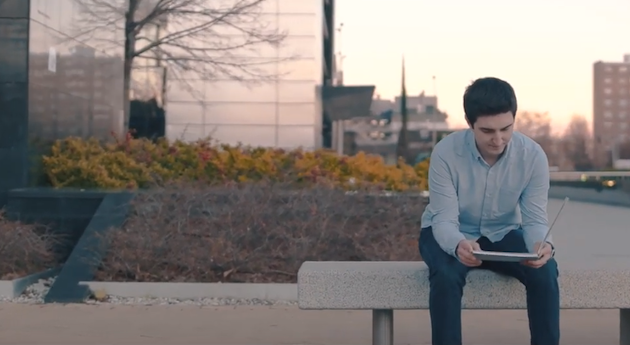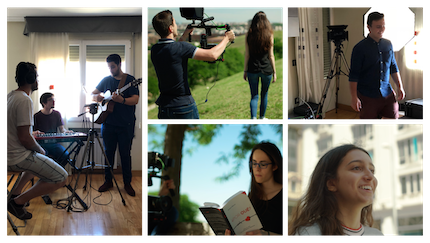The sudden loss of a loved one leads to questions that are faced in the short film ‘Spoiler: God Wins’, where Christian Luis Neira tells his own experience.
 Luis Neira, producer of the short film. / JesusOnTheWeb
Luis Neira, producer of the short film. / JesusOnTheWeb
In May 2018, the evangelical community in Spain lived with shock the news of the car crash of the Araguàs family, in which the young university student Lluna died.
In the short film ‘Spoiler: God Wins’, Luis Neira - Lluna's boyfriend - and two other friends, Débora Villalba and Bianca Pricop, talk about their feelings.
This true story deals with questions about suffering, God and faith in the midst of very difficult circumstances.
For Luis Neira, a multimedia producer, creating the video for the Jesus on the Web project has been both an act of love and a way to explain how the Christian's hope goes beyond death.
He spoke to Spanish news website Protestante Digital in the following interview.
Question. What has been the motivation to make this short film?
Answer. Without a doubt, love. And not only my love to Lluna, but that of the whole team that are part of this project, including, of course, her family. We wanted it to be a tribute. And at the same time, we wanted to use this video to give hope to all those who are going through a difficult time.
I remember that, days after the car crash, I read and re-read our WhatsApp conversations, and I came across a message from Lluna from October 2016. I had told her that the father of a common friend had died after a long battle with cancer. And one of her messages that day was: “At times like these it is when we can show the world our hope and trust in God”.
I have no doubt that Lluna's message was key to start the project. Even when we are broken, we share our faith because thousands are dying with no hope.
Q. According to your own experience, how can we deal with the pain of the sudden loss of someone we love?
A. No matter how you understand the world, death is death, and no one is prepared to face the pain and suffering caused by the sudden loss of a loved one.
Your life changes completely, it is a pain that always remains and you have to learn to live with it; that does not happen overnight.
In my case, it was my girlfriend. But for David and Elena it was a daughter. How do you overcome that? It is impossible, we are humans; you simply learn to live with that pain.
I think one does not realise how hard grief is until you live it in your own flesh. In my case, especially at the beginning, I tried to avoid pain by taking refuge at work, distracting myself with friends and family, or simply trying not to think about what had happened.
But the reality hit me every time I wanted to talk to her and I couldn't, even today when I still walk through the places we went and she is no longer with me, or in the nights when questions tortured me.
Each person copes with grief in a different way. I think it doesn't matter how many years you have been a believer, or all the experiences you have had with God, because when something like this happens, it shakes your faith completely.
 Several scenes of the short film shooting. / JesusOnTheWeb
Several scenes of the short film shooting. / JesusOnTheWebIt makes you ask yourself questions to which you don't find answers, but again, you learn to live with it.
Sometimes I have met people who tell me that asking questions or asking God questions is wrong, and they usually conclude saying “it happened because God wanted it that way”.
But God really didn't want it. Originally, God designed a world in which death and suffering did not exist. That is why I think asking God questions is not bad, it is human.
As Debora Villalba says in the video, in the Bible we found a lot of people who were extremely sincere with God about everything they were going through.
Something that gives me a lot of peace and hope is to think about Jesus. When his friend Lazarus died, Jesus arrived at the grave and there Mary - Lazarus' sister – said to him: “If you had been here, he would not have died”.
When Jesus saw her cry, along with the people who were accompanying her, he was so moved that he burst into tears. Moments later, Jesus resurrected Lazarus. He already knew he was going to resurrect him, but he cried for the love and compassion he felt for his friends.
That shows me a God who identifies with my pain, a God who does not look the other way or acts as if nothing had happened, but feels compassion for those who cry for the loss of a loved one. He is the one who promises a future of hope, in which there will be no death, no crying, no regret or pain.
Q. Talking about the issue of death seems a bit taboo, however in this short film it is the key topic.
A. That's right. Who wants to talk about death? Who wants to talk about suffering? However, we all will go through it at some point in our life.
The death of a loved one is something really sad, it marks the life of a person; and even more so if it has been a traumatic death.
We think that it is necessary to talk about death openly. Sometimes we have mistakenly understood that we need to hide the grief or sugar-coated it, saying that someday we will see that person again.
The separation, although we know it is temporary, can lead to a strong depression. And when that happens, in addition to pastoral care, the love and comfort of friends, family and the brothers of the church, professional help should be sought. It can happen to anyone, and I believe the church must be prepared to face those challenges.
In the video we talk about death and grief, but above all, about the hope that Jesus offers to all, and we have tried to do it in a natural way and with sincerity. We speak from the experience of a true story.
Q. What would you like viewers to feel when watching the short film?
A. Peace, comfort, and hope. In the video we give very few details about the life of Lluna - but she was a person who loved others, transmitted peace and joy wherever she went, and shared her faith with passion.
And that has been our goal for ‘Spoiler God Wins’: even in the midst of pain, passionately share the Good News.

Las opiniones vertidas por nuestros colaboradores se realizan a nivel personal, pudiendo coincidir o no con la postura de la dirección de Protestante Digital.
Si quieres comentar o